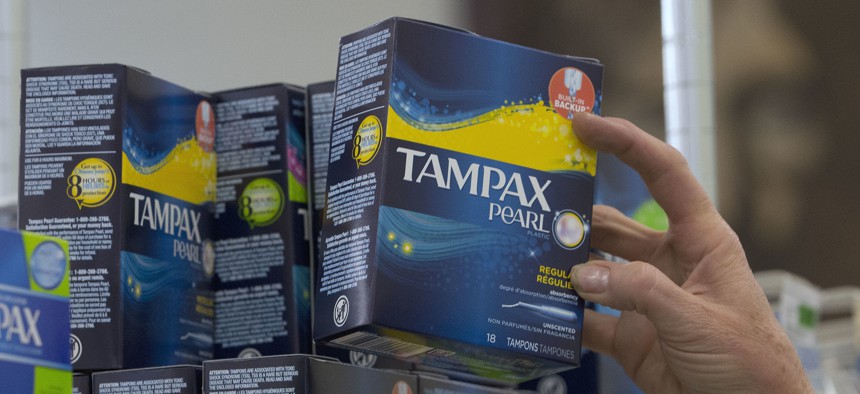A Teenager Needed a Tampon. When Her School Didn't Have One, She Called Her Legislator

Lack of access to menstrual products can keep girls out of school, a problem that disproportionately affects low-income families. AP Photo
A Pennsylvania teen teamed up with a state representative to write legislation that would require schools to provide free pads and tampons for students.
Last year, 17-year-old Lilly Minor popped into the bathroom at her Pennsylvania high school with an urgent—and common—problem.
“I needed a tampon,” she said Tuesday at a rally in Harrisburg. “And there were absolutely none to be found.”
Her school’s bathrooms had wall dispensers for sanitary pads and tampons, but they hadn’t been refilled in years. Minor thought that was inexcusable. So she contacted state Rep. Danielle Friel Otten.
Together, the two crafted Lilly’s Bill, a proposal that would require public schools (including charter schools) in Pennsylvania to provide free menstrual hygiene products in every bathroom accessed by female students in grades six through 12. Specifically, schools would need to provide a choice of at least two sizes of sanitary pads and a choice of at least two sizes of tampons.
Most schools already stock free menstrual products for students, but typically only in the school nurse’s office, which may be inconveniently located and not always open or staffed, Otten said.
“In many districts, nurses travel between multiple schools and may not be present during the entire school day; consequently, a student may not have access to menstrual hygiene products when they are needed,” she wrote in a memo to her colleagues in the House. “My constituent was concerned because if this issue is occurring in a relatively affluent area, the problem is likely to be significantly worse in less well-off regions of our Commonwealth.”
Lack of access to menstrual products can have negative impacts on girls’ education. A 2017 survey by feminine hygiene brand Always found that nearly one in five girls in the U.S. had either left school early or missed school entirely because they didn’t have the period products they needed. The problem disproportionately affects lower-income girls, whose families may have to choose between paying for pads or tampons and paying for groceries. That struggle is known as “period poverty,” Otten wrote.
“Having a menstrual cycle and being without the appropriate menstrual hygiene products should not impact school employees’ or students’ ability to work, go to school, and enjoy aspects of everyday life,” she said. “Students and school staff should be able to access menstrual hygiene products when they need them, without having to ask someone for them.”
Legislators in multiple states have begun to take up the issue. California, Illinois, New York and New Hampshire all require schools to provide free menstrual products to students. Earlier this year, U.S. Rep. Grace Meng, a New York Democrat, introduced legislation that would allow states to tap into federal grant money to provide students across the country with period products. The bill would also require Medicaid to cover the cost of pads and tampons and would allow individuals to use pre-tax dollars from flexible spending accounts to pay for supplies. The legislation, currently awaiting a hearing before the subcommittee on Crime, Terrorism, and Homeland Security, has 83 cosponsors, all of them Democrats.
Other states have addressed different aspects of the costs associated with menstruation. As of last summer, Connecticut no longer charges sales tax on tampons, the result of a provision tucked into the 2016 budget bill that took effect in July 2018. On Wednesday, legislators in Ohio passed a proposal repealing the state sales tax on all menstrual products; that bill heads next to the governor.
In Pennsylvania, Lilly’s Bill awaits a hearing before the House Committee on Education. Minor sees the measure, as well as the legislative process, as another step toward equity for female students.
“Menstrual equity is an issue that’s not often talked about because a lot of people find it kind of icky, and that’s a really unfortunate thing, because it’s a completely natural process that’s been happening as long as women have existed,” she said. “Girls need to be equal in our school systems. We do so many things to make them more equal because of the disparity that’s existed all this time, but STEM programs and community affairs and take-your-daughter-to-work day doesn’t work if the girls can’t go to school in the first place.”
Kate Elizabeth Queram is a Staff Correspondent for Route Fifty and is based in Washington, D.C.
NEXT STORY: Growing Up in a Walkable Neighborhood Can Increase Adult Income





